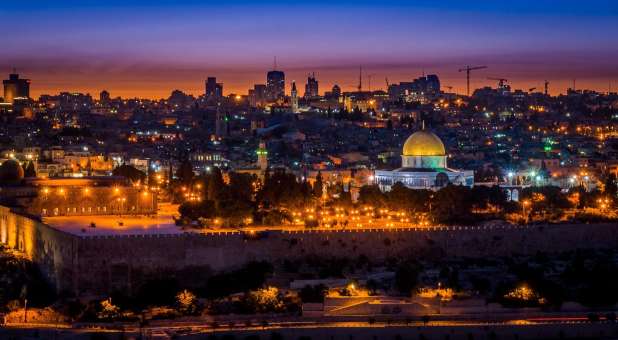In preparation for the fall feasts of Israel, let’s take a step back and look at the feasts as a whole. Are they merely fascinating historical occurrences, or do they hold deeper relevance for believers in Yeshua (Jesus) today, whether you’re Jewish or Gentile?
Throughout the ages, God has sought after the people of Israel, in order to bless them and to make them a blessing to many peoples (Gen. 12:2-3). He also gave Israel a sacred trust—to bear His Name and to be the nation from which His redemptive plan for the world would go forth (John 4:22). This plan is illustrated in the feasts He ordained.
These annual feasts are called “moedim” in Hebrew, meaning, “appointments.” In a sense, these “appointed times of the Lord” (Lev. 23:4) constitute God’s agenda with His redeemed people. Ultimately, they provide a Biblical and historical foundation for faith in Yeshua.
Messiah Yeshua was to be the fulfillment of the feasts; indeed, He is the purpose for their existence. “These (Feasts, Sabbath day …) are a shadow of the things to come, but the substance belongs to Messiah” (Col. 2:17). Even as all Scripture is inspired and profitable, these “shadows” are relevant for followers of Messiah today because they never stop pointing to Him! (2 Tim. 3:16).
So, what are these feasts and how do they outline God’s redemptive program? God’s seven annual appointed times are laid out in Leviticus 23. The first three feasts—Passover, Feast of Unleavened Bread, and Firstfruits—are celebrated in the springtime. These feasts illustrate the redemption accomplished in Yeshua’s first coming, when He became the “Lamb of God who takes away the sins of the world,” (John 1:29) and through His resurrection, our “Firstfruits of those who have fallen asleep” (1 Cor. 15:20).
The fourth feast, Pentecost (or “Feast of Weeks”), speaks of the establishment of the Body of Messiah when the Holy Spirit was poured out at this feast’s fulfillment (Acts 2:1).
The final three feasts come in the fall, during the seventh month of the Hebrew calendar. As the biblically significant number seven indicates, the fall feasts point to a time of completion and paint a prophetic picture of the coming fulfillment of God’s redemptive program.
The Feast of Trumpets (Lev. 23:23-25) is commonly called Rosh HaShanah or the Jewish New Year. When the Jewish people came out of Babylonian captivity, they adopted the Babylonian civil New Year as their own.
Even though it falls on the first day of the seventh month, it is called New Year’s Day. Because there is very little biblical information on this mysterious feast, Jewish tradition teaches that the blowing of trumpets, or shofars, during this feast recalls the ram’s horns Joshua and the Israelites used at Jericho, and of the ram that Abraham sacrificed in place of Isaac.
Scripture notes a time when Israel is gathered back to the land by the “blowing of a great ram’s horn” (Is. 27:13), and in the New Covenant, Paul explains this mystery as a time when all believers will be gathered to Messiah (1 Cor. 15:51,52; 1 Thess. 4:16-18). And because none of us know the exact time of this future “blowing of the trumpet,” the Feast of Trumpets should motivate us to readiness and service.
The next fall feast is the Day of Atonement (Yom Kippur). In Jewish tradition, this day is for Jewish individuals to “get right” with God. Biblically, it was a day for Israel to be restored to God as a servant nation (Lev 16, 23:26-32). Prophetically, it points to the time when Israel as a nation will be gathered to Messiah Yeshua.
At the end of the coming tribulation period, Israel as a nation will “look on Me (Messiah) whom they have pierced and mourn for Him as one mourns for a firstborn son” (Zech. 12:10). In that day, Israel will receive “cleansing from sin and impurity” (Zech 13:1), be grafted back into “their own olive tree,” and “thus all Israel will be saved!” (Rom. 11:23-26). The Day of Atonement reminds us that this national gathering of Israel is coming, motivating us to share the Good News of Messiah “to the Jew first and also to the Gentile” (Rom. 1:16).
Finally comes the Feast of Tabernacles (or the “Feast of Booths”). This harvest festival is called “Booths” because God commanded Israel to live in booths each year during this feast, to remember the time in the wilderness and how the Lord alone is our protection and security. This feast is also called the “Feast of Ingathering” (Ex. 23:16).
Today it is celebrated as a final harvest festival, accompanied by great joy in the provision of God for His people. Zechariah prophesied that the nations will one day be “ingathered” to Messiah. One day all surviving nations which had once attacked Israel will honor the King of Kings, the Messiah of Israel, by celebrating the Feast of Tabernacles in Jerusalem each year (Zech. 14:16-18).
We see the seventh month as pointing to the time when God will complete His redemptive plan, by gathering the Body of Messiah (the Feast of Trumpets), gathering the nation of Israel (the Day of Atonement), and gathering all nations (the Feast of Tabernacles) to Himself.
I hope that this article has given you a clearer picture of the amazing, incomprehensible love of God as you consider His redemptive plan in the context of His appointed times.
The Feasts of Israel are special times for all who trust in the One that they speak of, as we remember the great salvation He has provided for us, anticipate His glorious coming, and use them to share His great love and plan with Jewish and non-Jewish people who don’t yet know Him!
Dr. Sam Nadler is a Jewish believer in Jesus and has been in Messianic Jewish ministry for over 40 years. Sam is the president of Word of Messiah Ministries, which is bringing the Good News to the Jew first but not to the Jew only, and planting Messianic Congregations in Jewish communities worldwide. To equip the Body of Messiah in our shared calling, Sam has written multiple books on Jewish evangelism, discipleship, and the Feasts of Israel. Sam mentors Messianic leaders around the world, and regularly holds leadership conferences to train and encourage congregation planters in their vital ministry. For more information and resources, visit: www.wordofmessiah.org.
See an error in this article?
To contact us or to submit an article






















